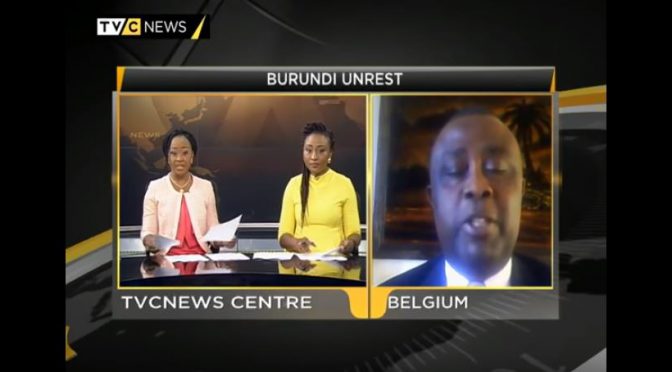In this conversation with TVC Breakfast anchored on my policy recommendation for an organised service export for Nigeria, I highlighted the Diaspora component of Nigeria’s current Renewed 4D Foreign Policy doctrine as providing the required framework.
Tag: TVC
Breaking the Burundi Peace and Crisis Circle
Over the past year Burundi and its political crisis is degenerating into a sore on the collective conscience of the world. The relative silence of the international community has drowned the loud silence of the Bujumbura protesters who trouped out of the streets of the capital in their hundreds against the announcement by the ruling CNDD-FDD party that incumbent president Pierre Nkurunziza would be their candidate for their next election. A lot have been happening since 26 April 2015 when 15 year-old Jean Nepomuscene Komezamahoro or Jean-Nepo to his friend, was tragically gunned down at point blank range by a police officer on his way back from church. The current social, economic and political abyss into which Burundi has sunk began on that faithful day, ushering in a period in Burundi history now referred to a Peace and Crisis Circle.
In the one year since the beginning of the current crisis, I have offered analyses and commentaries pointing to the measures required to install lasting peace in that beautiful but troubled nation with violent government repression pretty commonplace. It is estimated by international observers that around 1,500 people have died so far with a further estimated 700 people unaccounted for, perhaps executed. My consistent position has been that though the crisis in Burundi can only be sorted out via a genuine political dialogue, the international community has the obligation to push the Burundian government to return to the negotiations table for open, frank broad-based and credible discussions.
It is elevating to learn that an inter-Burundi Dialogue commenced in Arusha, Tanzania on 12 July 2016. The Dialogue is being attended by a broadly composed stakeholder groups including former Heads of State, the National Commission for Inter-Burundi Dialogue (CNDI), all Political Parties registered in Burundi, Civil Society Organizations, human rights and military observers of the African Union, Faith-based Groups, prominent Political Actors inside and outside Burundi, as well as Women and Youth groups. I was guest of Television Continental (TVC) at the conclusion of the first day of the Dialogue to evaluate the proceedings and to touch on the expectations out of the Dialogue. I have clustered the expectations out of the Dialogue along stakeholder lines including Civil Society Organisations & Opposition Forces, Donor Agencies and International Organisations and Government of Burundi.
GOVERNMENT OF BURUNDI
After 10 years of steady economic growth, Burundi has experienced, expectedly, a negative growth of 4 percent in 2015. Starting with Belgium, funds for police, judicial, political and infrastructure reforms were withheld or withdrawn from international partners but not cancelled. International donors are expected to use their seat on the negotiation table to spell out their benchmarks for re-engagement. In parallel to a political dialogue process, the Government of Burundi and international donors are expected to intensify their conversation on the socioeconomic impact of the crisis. It is perhaps reasonable to expect the government of Burundi to underwrite the pre-crisis conditions that will enable resumption of reforms which will in turn improve the socioeconomic situation of the population.
DONOR AGENCIES – INTERNATIONAL ORGORGANISATIONS
It is expected that the socioeconomic dimension of the current crisis would receive a robust attention. In line with the holistic approach of peacebuilding, the dialogue must serve as a platform to include the socioeconomic dimension into the international debate on Burundi. One can only expect that this dialogue will help to clarify mutual expectations. Government’s vision must be to reset cooperation with international partners. The Burundi Poverty Reduction Strategy is a crucial tool in this regards. The donor agencies and international organisations will seek to mobilize the combined forces of the Civil Society as natural allies to know precisely what they want to see in the strategy paper and use this opportunity to redefine and push through their demands.
CIVIL SOCIETY ORGANISATIONS – OPPOSITION:
Preliminary findings by the National Commission seem to indicate that a key request of the population is to amend the Constitution and to revise the Arusha Agreement particularly as they relate to ethnic quotas, term limits for the President, and dual citizenship. Some national and many international observers are expressing concerns that tensions in Burundi could rise if the current process evolves into a campaign to revise the Arusha Agreement. That notwithstanding, it may not be an unfair expectation for a roadmap to national unity to be achieved whereby the president is allowed to serve out the current term in exchange for an understanding on the reversal of the Arusha Agreement.
The Collins Nweke interview on TVC News Hour on Inter-Burundi Dialogue is available here
